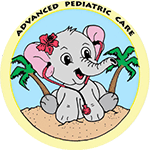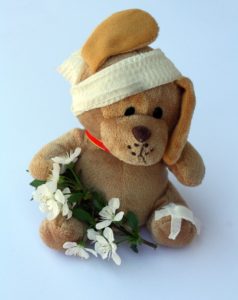Advanced Pediatric Care
After Hours & Emergencies
 Emergencies
Emergencies
If an emergency should arise, please call 911. Emergencies are considered to be those conditions that are life-threatening: loss of consciousness, severe bleeding, seizure, etc. In the case of minor emergencies (lacerations, cuts, mild fractures, sprains), please call our office first for instructions.
Important Contacts
National Poison Control ----- (800) 222-1222
Florida Domestic Violence Hotline ----- (800) 500-1119
Sexual Assault Crisis Hotline ----- (888) 956-7273
Suicide Hotline ----- (800) 346-6185 or (800) 273-8255
You may contact the office at our main number and select to leave a message for your provider. The messages will be checked frequently throughout the day and messages will be assessed by our medical staff and the providers accordingly. When leaving a message that requires a return call, please leave the phone number, an alternate number and a time period for which you can be reached to minimize "phone tag".
For urgent problems during office hours do not leave messages on the provider message hotline. Any urgent or immediate concerns should go to our front desk staff by dialing our office.
For Urgent Care and Questions After Office Hours Which Cannot Safely Wait Until the Next Business Day:
We are available either in person or by phone 24/7 365 days a year. Call our main number and select the option to be connected with Dr. Ali. Please note this number is for EMERGENCIES ONLY, and we ask that routine calls for your provider or the office wait until the office is open during regular business hours. Please keep in mind that our physicians are at home with their families.
You might also check out www.healthychildren.org for some good information on basic health problems. Just click Symptom Checker.
You can also take advantage of 24 hour on call nurses. Please call the number that corresponds to your child’s insurance plan and follow the instructions to talk to a Nurse. Below are listing for common insurances:
Blue Cross/Blue Shields FL Health Care Plans ----- (866) 548-0727
Florida Blue ----- (877) 789-2583
Sunshine Health ----- (866) 796-0530 option 7
Molina Healthcare ----- English (888) 275-8750 or Spanish (866) 648-3537
Molina Healthcare Healthy Advantage (HMO SNP) ----- (866) 472-0601
United Healthcare ----- (800) 237-4936
Humana First ----- (800) 622-9529
Wellcare ----- (800) 919-8807
Cigna ----- (800) 564-9286 or (800) 244-6224
Aetna ----- (800) 556-1555
AvMed ----- (888) 762-8633
Capital Health ----- (850) 383-3400
Coventry ----- (866) 903-0802
Tricare ----- (800) 874-2273 option 1
Amerigroup ----- (800) 600-4441 English x35940 or Spanish x35941
Memorial Hospital ----- (800) 530-3244
Find Local 24-hour pharmacies:
CVS http://www.cvs.com/store-locator/landing
Walgreens http://www.walgreens.com/storelocator/find.jsp
Find Local Children's Hospitals:
Wolfson Children's Hospital https://www.baptistjax.com/locations/wolfson-childrens-hospital
Nemours Children's Specialty Care http://www.nemours.org/locations/florida/jacksonville.html
UF Health Pediatrics http://ufhealthjax.org/pediatrics/
St. Vincent's Pediatrics http://www.jaxhealth.com/services/st-vincents-pediatrics/
Memorial Hospital Pediatrics http://memorialhospitaljax.com/service/pediatric
Cardiopulmonary Resuscitation (CPR)
In the past, we used the "ABC's of CPR " because it reminded us that there was a very specific order in which a person should be resuscitated. However, the American Heart Association updated its recommendations for CPR in October, 2010 and now recommends that an untrained rescuer begin chest compressions immediately. The ABC acronym has been changed to CAB.
Compressions
Airway
Breathing
Untrained rescuers should focus on continuous compressions and not perform mouth-to-mouth resuscitation if they are not familiar with it.
CPR for Infants (Under 1 year):
EVALUATE your child's condition. Shout or gently shake your child to see if he will awaken. Put your ear next to his nose and listen for breathing. Look at the chest to see if it rises with each breath.
CALL FOR HELP. Have someone dial 911. If no one is available, do CPR for 2 minutes before calling 911.
IF YOUR CHILD IS NOT BREATHING OR WILL NOT AWAKEN:
POSITION your child. Put him on his back on a firm surface. If you think he could have injured his neck, support his head in order to keep the neck from twisting as you roll him over.
TILT THE HEAD BACK so that his nose is "in the air". Check the mouth to make sure your child has not choked on anything.
BEGIN CHEST COMPRESSIONS. With an infant, place two fingers on the breastbone, with your index finger at the height of the nipples. Compress at a depth of 1 1/2 inches (about 1/3 of the chest height) at a rate of two compressions per second. Do 30 compressions.
GIVE 2 RESCUE BREATHS. For an infant, place your mouth over his mouth and nose and breathe GENTLY, watching to see if the chest rises and falls. If not, readjust the head (see POSITION above), then give 2 breaths and return to chest compressions. NOTE: If the chest will not rise (or you do not know how to do rescue breaths), skip that step and just do chest compressions. You can try it again after 30 more compressions.
Continue chest compressions and breathing until paramedics arrive.
CPR for Children (1 to 8 years):
EVALUATE your child's condition. Shout or gently shake your child's shoulders to see if he will awaken. Put your ear next to his nose and listen for breathing. Look at the chest to see if it rises with each breath.
CALL FOR HELP. Have someone dial 911. If no one is available, do CPR for 2 minutes before calling 911.
IF YOUR CHILD IS NOT BREATHING OR WILL NOT AWAKEN:
POSITION your child. Put him on his back on a firm surface. If you think he could have injured his neck, support his head in order to keep the neck from twisting as you roll him over.
TILT THE HEAD BACK so that his nose is "in the air". Check the mouth to make sure your child has not choked on anything.
BEGIN CHEST COMPRESSIONS. For a child, put one hand on the chest between his nipples. Lock your elbows and press straight down about 2 inches. Continue for 30 compressions at a rate of two compressions per second.
GIVE 2 RESCUE BREATHS. For a child, place your mouth over his mouth and press his nose shut with your fingers. Breathe GENTLY, watching to see if the chest rises and falls. If not, readjust the head (see POSITION above), then give 2 breaths and return to chest compressions. NOTE: If the chest will not rise (or you do not know how to do rescue breaths), skip that step and just do chest compressions. You can try it again after 30 more compressions.
Continue chest compressions and breathing until paramedics arrive.
CPR for Older Children & Adults:
EVALUATE THE VICTIM Shout or gently shake her shoulders to see if she will awaken. Put your ear next to her nose and listen for breathing. Look at the chest to see if it rises with each breath.
CALL FOR HELP. Have someone dial 911. If no one is available, do CPR for 2 minutes before calling 911.
IF YOUR CHILD IS NOT BREATHING OR WILL NOT AWAKEN:
POSITION the victim. Put her on her back on a firm surface. If you think she could have injured her neck, support her head in order to keep the neck from twisting as you roll her over.
TILT THE HEAD BACK so that her nose is "in the air". Use a "Chin Lift" by pulling up on the back of the jaw to open the airway. If you did not witness the event, check the mouth to see if there is any food/foreign body.
BEGIN CHEST COMPRESSIONS. Put the heel of your hand in the middle of her chest, placing the other hand over the first hand. Lock your elbows and press straight down about 2 inches. Allow the chest to return to its normal position. Continue for 30 compressions at a rate of 100 times a minute. (Some people recommend that you press to the beat of "Stayin' Alive").
If you have NOT been trained in CPR, you may continue to just give chest compressions until help arrives or the victim wakes up. Otherwise, proceed to give rescue breaths.
If you are in a public building that has an automated external defibrillator (AED), turn it on. If you saw the victim collapse, attach the AED immediately and follow the instructions. Otherwise, perfom CPR for 1 minute before using the AED.
GIVE 2 RESCUE BREATHS. Place your mouth over her mouth (or use a CPR mask if available) and press her nose shut with your fingers. Breathe GENTLY, watching to see if the chest rises and falls. If not, readjust the head (see POSITION above), then give 2 breaths and return to chest compressions. NOTE: If the chest will not rise (or you do not know how to do rescue breaths), skip that step and just do chest compressions. You can try it again after 30 more compressions*.
Continue chest compressions and breathing until paramedics arrive.
Click Contact Us to schedule an appointment now.
Advanced Pediatric Care Arlington Location: 943 Cesery Blvd, Ste G, Jacksonville, FL 32211
Call now: (904) 861-1330

